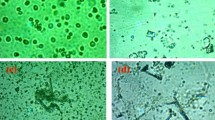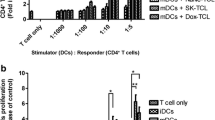Abstract
Purpose
Dendritic cell (DC)-based cancer vaccines have become an attractive antitumour therapeutic approach. However, clinical application of current DC-based cancer vaccines has been limited by their ineffectiveness. Heat shock protein 70 from Mycobacterium tuberculosis (TBhsp70) is known to have a potent adjuvant capability to induce maturation of DCs and thus acts as an alternative ligand to the CD40 ligand (CD40L) on T cells to induce a T-cell response. The aim of this study is to investigate whether the combination of TBhsp70-H22 tumour-peptide complexes and CD40L might improve the antitumour efficacy for development of therapeutic DC-based vaccines against hepatoma.
Methods
The CD40, CD80, CD86 and HLA-DR expression on DCs pulsed with TBhsp70-H22 tumour-peptide complexes and soluble CD40L was studied by flow cytometric analysis, and T-helper type 1 cytokine secretion, such as IL-12p70 secretion, was tested by ELISA. The H22-specific cytotoxic T-lymphocytes (CTLs) were detected by a 51Cr-release assay, and the in vivo antitumour immunity against hepatoma was measured by utilising H22-tumour-bearing mice after therapeutic administration.
Results
Up-regulation of CD40, CD80, CD86 and HLA-DR expression on DCs pulsed with TBhsp70-H22 tumour-peptide complexes and CD40L was found, which stimulated a high level of T-helper type 1 cytokine secretion, such as IL-12p70, and resulted in the induction of H22-specific CTLs. The therapeutic administration of DCs pulsed in vitro with TBhsp70-H22 tumour-peptide complexes and CD40L significantly reduced the progression of H22 tumours in mice compared with DC-Hsp70-H22 peptide complexes or DC-CD40L alone.
Conclusions
Our findings demonstrate that DCs pulsed with Hsp70-H22-peptide complexes and CD40L enhance the antitumour immunity against hepatoma, which provides a novel immunotherapeutic approach against cancer.





Similar content being viewed by others
References
Adams E, Britton W, Morgan A, Sergeantson S, Basten A (1994) Individuals from different populations identify multiple and diverse T-cell determinants on mycobacterial Hsp70. Scand J Immunol 39:588–596
Alexandroff AB, Jackson AM, Paterson T, Haley JL, Ross JA et al (2000) Role of CD40–CD40 ligand interactions in the immune response to solid tumors. Mol Immunol 37:515–526
Banchereau J, Steinman RM (1998) Dendritic cells and the control of immunity. Nature 392:245–252
Becker T, Hartl FU, Wieland F (2002) CD40, an extracellular receptor for binding and uptake of Hsp70-peptide complexes. J Cell Biol 158:1277–1285
Brossart P, Wirths S, Stuhler G, Reichardt VL, Kanz L et al (2000) Induction of cytotoxic T-lymphocyte responses in vivo after vaccinations with peptide-pulsed dendritic cells. Blood 96:3102–3108
Caux C, Massacrier C, Vanbervliet B, Dubois B, Van Kooten C et al (1994) Activation of human dendritic cells through CD40 cross-linking. J Exp Med 180:1263–1272
Cohen S, Haimovich J, Hollander N (2009) Dendritic cell-based therapeutic vaccination against myeloma: vaccine formulation determines efficacy against light chain myeloma. J Immunol 182:1667–1673
Hanks BA, Jiang J, Singh RA, Song W, Barry M et al (2005) Re-engineered CD40 receptor enables potent pharmacological activation of dendritic-cell cancer vaccines in vivo. Nature Med 11:130–137
Hanson HL, Donermeyer DL, Ikeda H, White JM, Shankaran V et al (2000) Eradication of established tumors by CD8+ T cell adoptive immunotherapy. Immunity 13:265–276
Hoos A, Levey DL (2003) Vaccination with heat shock protein-peptide complexes: from basic science to clinical applications. Expert Rev Vaccines 2:369–379
Huang Q, Richmond JF, Suzue K, Eisen HN, Young RA (2000) In vivo cytotoxic T lymphocyte elicitation by mycobacterial heat shock protein 70 fusion proteins maps to a discrete domain and is CD4(+) T cell independent. J Exp Med 191:403–408
Jefford M, Maraskovsky E, Cebon J, Davis I (2001) The use of dendritic cells in cancer therapy. Lancet 2:343–353
Kuppner MC, Gastpar R, Gelwer S, Nossner E, Ochmann O et al (2001) The role of heat shock protein (hsp70) in dendritic cell maturation: hsp70 induces the maturation of immature dendritic cells but reduces DC differentiation from monocyte precursors. Eur J Immunol 31:1602–1609
Lai EC, Lau WY (2005) The continuing challenge of hepatic cancer in Asia. Surgeon 3:210–215
Lan YH, Li YG, Liang ZW, Chen M, Peng ML et al (2007) A DNA vaccine against chimeric AFP enhanced by HSP70 suppresses growth of hepatocellular carcinoma. Cancer Immunol Immunother 56:1009–1016
Li Z (2004) In vitro reconstitution of heat shock protein-peptide complexes for generating peptide-specific vaccines against cancers and infectious diseases. Methods 32:25–28
Lutz MB, Kukutsch N, Ogilvie AL, Rossner S, Koch F et al (1999) An advanced culture method for generating large quantities of highly pure dendritic cells from mouse bone marrow. J Immunol Methods 223:77–92
Moser M, Murphy KM (2000) Dendritic cell regulation of TH1-TH2 development. Nat Immunol 1:199–205
Ojima T, Iwahashi M, Nakamura M, Matsuda K, Nakamori M et al (2006) Successful cancer vaccine therapy for carcinoembryonic antigen (CEA)-expressing colon cancer using genetically modified dendritic cells that express CEA and T helper-type 1 cytokines in CEA transgenic mice. Int J Cancer 120:585–593
Peng ML, Chen M, Ling N, Xu HM, Qing YL et al (2006) Novel vaccines for the treatment of chronic HBV infection based on mycobacterial heat shock protein 70. Vaccine 24:887–896
Reinhard G, Marten A, Kiske SM, Feil F, Bieber T et al (2002) Generation of dendritic cell-based vaccines for cancer therapy. Br J Cancer 86:1529–1533
Roman E, Moreno C (1996) Synthetic peptides non-covalently bound to bacterial hsp 70 elicit peptide-specific T-cell responses in vivo. Immunology 88:487–492
Schoenberger SP, Toes RE, Voort EI, Offringa R, Melief CJ (1998) T-cell help for cytotoxic T lymphocytes is mediated by CD40/CD40L interactions. Nature 393:480–483
Schulz O, Edwards AD, Schito M, Aliberti J, Manickasingham S et al (2000) CD40 triggering of heterodimeric IL-12 p70 production by dendritic cells in vivo requires a microbial priming signal. Immunity 13:453–462
Shojaeian J, Jeddi-Tehrani M, Dokouhaki P, Mahmoudi AR, Ghods R et al (2009) Mutual helper effect in copulsing of dendritic cells with 2 antigens: A novel approach for improvement of dendritic-based vaccine efficacy against tumors and infectious diseases simultaneously. J Immunother 32:325–332
Shurin MR, Yurkovetsky ZR, Tourkova IL, Balkir L, Shurin GV (2002) Inhibition of CD40 expression and CD40-mediated dendritic cell function by tumor-derived IL-10. Int J Cancer 101:61–68
Srivastava PK (2002) Interaction of heat shock proteins with peptides and antigen presenting cells: chaperoning of the innate and adaptive immune responses. Annu Rev Immunol 20:395–425
Srivastava PK, Amato RJ (2001) Heat shock proteins: the ‘Swiss Army Knife’ vaccines against cancers and infectious agents. Vaccine 19:2590–2597
Todryk S, Melcher AA, Hardwick N, Linardakis E, Bateman A et al (1999) Heat shock protein 70 induced during tumor cell killing induces Th1 cytokines and targets immature dendritic cell precursors to enhance antigen uptake. J Immunol 163:1398–1408
Van den Broeke LT, Daschbach E, Thomas EK, Andringa G, Berzofsky JA (2003) Dendritic cell-induced activation of adaptive and innate antitumor immunity. J Immunol 171:5842–5852
Wang Y, Kelly CG, Karttunen JT, Whittall T, Lehner PJ et al (2001) CD40 was a cellular receptor mediating mycobacterial heat shock protein 70 stimulation of CC-chemokines. Immunity 15:971–983
Wang Y, Kelly CG, Singh M, McGowan EG, Carrara AS et al (2002) Stimulation of Th1-polarizing cytokines, C–C chemokines, maturation of dendritic cells, and adjuvant function by the peptide binding fragment of heat shock protein 70. J Immunol 169:2422–2429
Wang Y, Whittall T, McGowan E, Younson J, Kelly C et al (2005) Identification of stimulating and inhibitory epitopes within the heat shock protein 70 molecule that modulate cytokine production and maturation of dendritic cells. J Immunol 174:3306–3316
Whiteside TL, Stanson J, Shurin MR, Ferrone S (2004) Antigen-processing machinery in human dendritic cells: up-regulation by maturation and down-regulation by tumor cells. J Immunol 173:1526–1534
Wu Y, Wan T, Zhou X, Wang B, Yang F et al (2005) Hsp70-like protein 1 fusion protein enhances induction of carcinoembryonic antigen-specific CD8+ CTL response by dendritic cell vaccine. Cancer Res 6:4947–4954
Acknowledgments
We are grateful for the assistance of the faculty from the Institute for Viral Hepatitis at Chongqing University of Medical Sciences. We thank Dr. Tao Deng, Toronto General Research Institute, University Health Network, for helpful discussions and editing of this manuscript. This work was supported by the National Natural Science Foundation of China (No. 30300297) and the Medical Science Foundation Major Project of Health Bureau of Chongqing (No. 20111055).
Conflict of interest
None.
Author information
Authors and Affiliations
Corresponding author
Rights and permissions
About this article
Cite this article
Gao, J., Luo, S.M., Peng, M.L. et al. Enhanced immunity against hepatoma induced by dendritic cells pulsed with Hsp70-H22 peptide complexes and CD40L. J Cancer Res Clin Oncol 138, 917–926 (2012). https://doi.org/10.1007/s00432-012-1166-6
Received:
Accepted:
Published:
Issue Date:
DOI: https://doi.org/10.1007/s00432-012-1166-6




